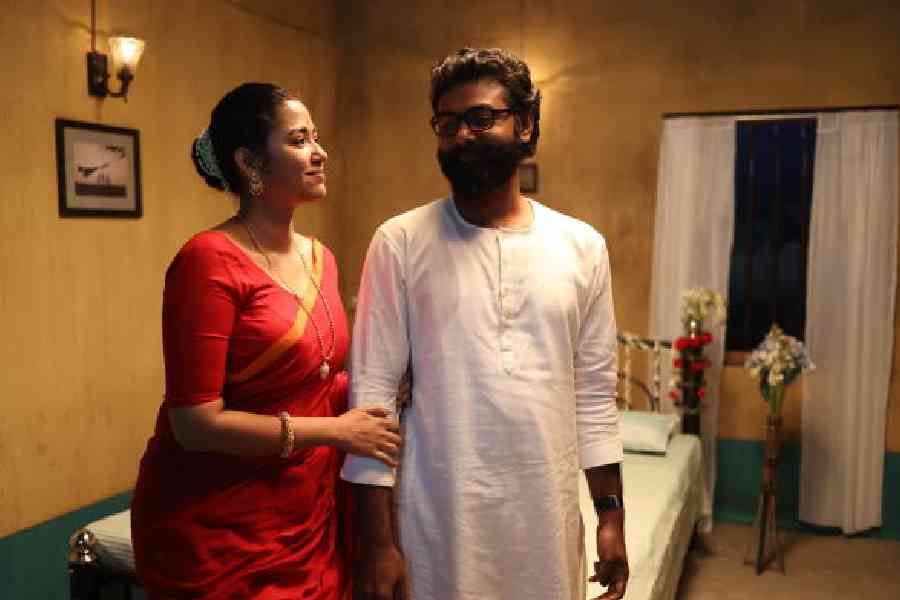Othello is a dark play with a tragic ending; the characters are handled beautifully, each distinctly standing out from the other. Iago plays an important role in the play as an archetypal villain. In the play, he has the biggest share of dialogues. His angst and vileness can be seen throughout the play. He knew the weaknesses and sore points of Othello and played with them easily. Othello was an egoistic man and Iago cunningly toyed with his ego in a smart way. He brilliantly used Othello’s own ego against him without even giving him a hint.
Now Athhoi, the Bengali film adaptation of Othello, is set in a village called Bhinsura, a very dry unknown geographical locale with a disruptive bio-diverse backdrop. Athhoi is a Dalit. He comes to Bhinsura with his widowed mother and later he is rescued by Anagra’s (Anirban Bhattacharya) father. Athhoi grows up, comes to Calcutta and meets Diyamona and they fall in love. Diyamona’s father doesn’t approve and he curses Athhoi that if a daughter can betray her own father, then one day the same betrayal is waiting for Athhoi.
Athhoi’s insecurity is primarily because he is a Dalit. It is extremely important to note that Anirban Bhattacharya (creative director), Arno Mukhopadhyay (story, screenplay and dialogue) and DoP Soumik Halder’s filmmaking vision is extraordinary. Both Anirban and Arna have read between the lines of the text and subtly incorporated the vital socio-political issues in the movie. The three of them together concentrate on one scene at a time and handle the emotions and their presentations in a very unusual way. Emotions like jealousy and guilt have been handled in an extremely theatrical way and it is not difficult for the viewers to relate to them.
The theatrical setting of Bhinsura — whether it is Athhoi’s house, the secret place where Gogo and Athhoi meet, or the bridge — adds to the poetic visuals. Visually, it’s one of Soumik’s best works till date. He is extraordinarily brilliant in Athhoi. The way Athhoi’s house is decorated with tiny fairy lights on the night of the wedding, the way there is a tube light under a bamboo beside the framework, the way fire and water merge beside the bridge, the way a torch becomes a very important characteristic throughout the entire movie — without tremendous artistic control and skill in camera, lighting and direction, this cannot be achieved.
The one-on-one interactions of Athhoi and Anagra remind us of some of the famous scenes from the play Mephisto, based on Klaus Mann’s 1936 novel of the same name, Ariane Mnouchkine’s stage version of the book and Hungarian filmmaker Istvan Szabo’s movie adaptation. The last interaction between Anagra and Athhoi reminds us of Vikram and Betal. Their tales, believed to have originated in the 11th century, feature the legendary King Vikram Aditya and the wise ghost Betal, who challenges the king with moral and ethical dilemmas. Through their encounters, each tale imparts valuable lessons on righteousness, wisdom, and the consequences of one’s actions.
Great actors share certain characteristics whether they work in a film or a play. A passion for performing and entertaining is a key quality, and a good actor should have the confidence to portray his role in a production convincingly and connect with audiences. Anirban Bhattacharya is undoubtedly one of them. Anirban will remain one of the finest actors of our times.
Arna Mukhopadhyay is brilliant. In addition to his love for Bhinsura and Diyamona, Athhoi Kumar Lodha will be remembered for his sincerity and honesty. He is a man of integrity and is highly respected as a doctor in Bhinsura. However, these admirable qualities are overshadowed by his tragic flaw, making his character even more complex and tragic. The mobile phone and news of Palestine, which Athhoi hears, becomes an alter ego or a subconscious of people in war, starving across the world. I think it’s quite interesting that even William Shakespeare mentioned Palestine in his play — “I know a lady in Venice would have walked barefoot to Palestine for a touch of his nether lip...”
Sohini Sarkar as Diyamona is superb... she is a scene-stealer and her intensity of handling such a classical character proves that undoubtedly she will remain as one of the most powerful actors of this generation. Mimi Dutta is very organic and subtle in the film.
Subhadeep Guha’s background score is very good. It was great to see so many new actors, including Arpan Ghosal as Mukul, in Athhoi. He is brilliant. This movie will be remembered just like the cult classic Meghe Dhaka Tara by Kamaleswar Mukherjee.










